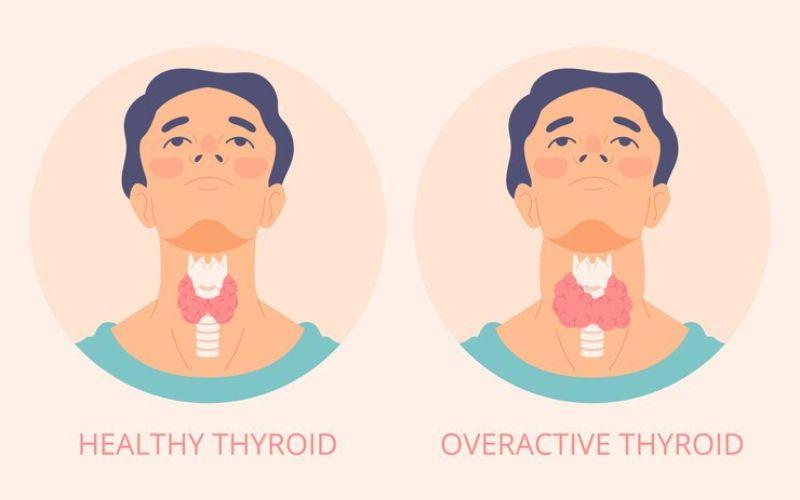Introduction
Thyroid cancer is one of the most rapidly increasing types of cancer worldwide. While it remains less common than many other cancers, its rate of diagnosis has been on the rise. Early detection plays a crucial role in successful treatment outcomes, making it essential to be aware of the early signs and symptoms. The thyroid gland, a small, butterfly-shaped organ located at the base of your neck, has a vital role in regulating metabolism, heart rate, and energy levels. When thyroid cancer develops, it often presents subtle symptoms that, if ignored, could worsen. Here, we’ll explore the signs of thyroid cancer that you shouldn’t ignore and when it’s time to see a doctor.
What is Thyroid Cancer?
Thyroid cancer occurs when cells in the thyroid gland begin to grow uncontrollably, leading to the formation of tumors. While most cases can be treated effectively, some types of thyroid cancer can be aggressive. The most common types include:
- Papillary Thyroid Cancer: The most common type, accounting for around 80% of all cases, typically has a good prognosis.
- Follicular Thyroid Cancer: Slightly less common, but also with a favorable outlook.
- Medullary Thyroid Cancer: Rarer, but it can be linked to genetic syndromes.
- Anaplastic Thyroid Cancer: A rare and aggressive form of thyroid cancer.
Awareness of the early warning signs of thyroid cancer is key to early intervention, which can lead to better outcomes.
Signs and Symptoms of Thyroid Cancer
Most early cases of thyroid cancer do not cause noticeable symptoms. However, as the tumor grows, signs may begin to appear. Here are the early warning signs of thyroid cancer you should be aware of:
1. Lump or Swelling in the Neck
A noticeable lump or swelling at the base of your neck is often the first sign of thyroid cancer. This lump may not always be painful but can feel hard or fixed in place. It’s important to consult a healthcare professional if you notice any unusual growth or swelling, as this could be an early indicator.
2. Hoarseness or Voice Changes
Changes in your voice, particularly persistent hoarseness, can indicate that the cancer is affecting your vocal cords. If you notice a significant change in your voice that lasts more than a few weeks, it’s worth getting checked out, as it could be linked to thyroid cancer.
3. Difficulty Swallowing
A growing thyroid tumor can press against your esophagus, making swallowing difficult. If you experience frequent difficulty swallowing or feel like food is getting stuck in your throat, this could be a sign of thyroid cancer that requires medical attention.
4. Neck Pain
Pain in the front of the neck, sometimes extending to the ears, can be another sign. While this type of pain is often mistaken for other issues, it’s important to take neck pain seriously if it persists without an obvious cause.
5. Swollen Lymph Nodes
Thyroid cancer can sometimes spread to the lymph nodes in your neck, leading to noticeable swelling. Swollen lymph nodes that don’t go away after a few weeks should be evaluated by a healthcare provider.
6. Persistent Cough
A persistent cough, not related to a cold or respiratory infection, may be another early warning sign of thyroid cancer. If you experience a cough that doesn’t go away, especially without accompanying symptoms of illness, it’s worth having it checked.

Who is at Risk for Thyroid Cancer?
While thyroid cancer can affect anyone, some factors increase the likelihood of developing the disease. Understanding your risk factors can help you be more vigilant about noticing potential symptoms.
- Family History: If you have a family history of thyroid cancer or genetic syndromes like multiple endocrine neoplasia (MEN), your risk is higher.
- Gender: Thyroid cancer is more common in women than men, with women being three times more likely to develop the disease.
- Age: While it can occur at any age, thyroid cancer is most commonly diagnosed in people over the age of 30, and the risk increases with age.
- Radiation Exposure: If you have undergone radiation treatments to the head, neck, or chest in the past, or were exposed to high levels of radiation, you have a higher risk of developing thyroid cancer.
Diagnosis and When to Seek Medical Attention
If you notice any of the signs of thyroid cancer mentioned above, it’s important to see a doctor promptly. Early diagnosis is crucial for effective treatment. Diagnostic tools for thyroid cancer include:
- Physical Examination: A healthcare professional will examine your neck for lumps or swelling.
- Ultrasound: A non-invasive imaging test that helps doctors see if there are nodules in the thyroid gland.
- Fine-Needle Aspiration Biopsy: A small tissue sample from the thyroid nodule can help confirm if the cells are cancerous.
If you notice any suspicious symptoms or risk factors, Healzone Medical Tourism offers comprehensive evaluations and diagnostic services for thyroid cancer. Don’t wait for symptoms to worsen before seeking medical advice.
Treatment Options for Thyroid Cancer
If thyroid cancer is detected, the treatment options vary depending on the type and stage of cancer. The most common treatments include:
- Surgery: Removal of part or all of the thyroid (thyroidectomy) is often the first step in treating thyroid cancer.
- Radioactive Iodine Therapy: This treatment is used after surgery to destroy any remaining thyroid tissue or cancer cells.
- Radiation Therapy: For more advanced cases, radiation therapy may be used to target and kill cancer cells.
- Prognosis: The outlook for thyroid cancer patients is generally positive, especially when the cancer is caught early.
Prevention and Monitoring
While there’s no sure way to prevent thyroid cancer, you can take steps to monitor your thyroid health:
- Regular Checkups: If you’re at higher risk due to family history or past radiation exposure, regular checkups are essential.
- Maintain a Healthy Diet: Ensuring your diet includes adequate iodine, which supports thyroid function, may help reduce the risk.
- Avoid Unnecessary Radiation: Take steps to avoid exposure to unnecessary radiation, particularly in the head and neck area.
Conclusion
Thyroid cancer can be a silent condition, with symptoms often appearing gradually. However, staying informed and vigilant about potential warning signs can make all the difference. If you notice any of the signs discussed—such as a lump in the neck, voice changes, or difficulty swallowing—don’t delay in seeking medical attention. Early diagnosis and treatment significantly improve the chances of a positive outcome.
For expert evaluation and guidance, reach out to Healzone Medical Tourism today. We are committed to providing world-class medical care and ensuring your health is in the best hands.
 Translate
Translate
 English
English  العربية
العربية  Русский
Русский  বাংলা
বাংলা 

